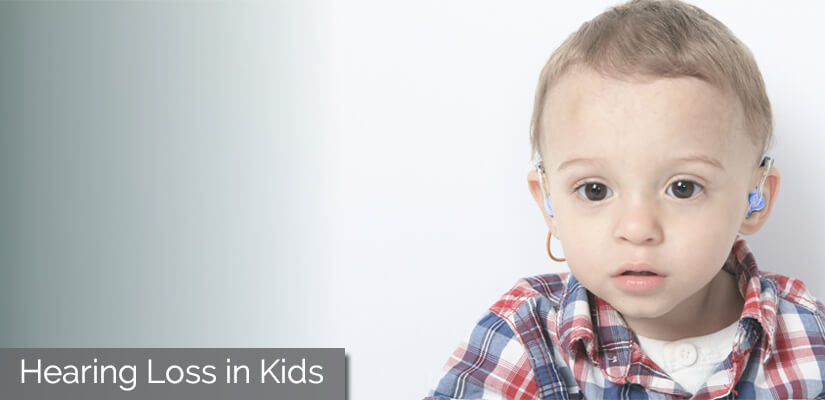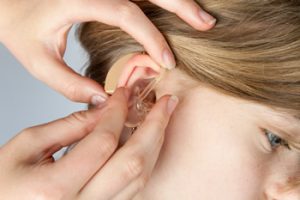
Children learn communication by copying the sounds they hear. If the hearing loss in children is undetected and untreated, they can miss much of the speech and language around them. This results in delayed speech development, social problems, and academic difficulties. According to the recent infant screening in India 5-6 infants out of 1000 born with hearing loss.
Hearing loss, in varying degrees, affects two children in every 100 children under the age of Eighteen. Unfortunately, there are very few hearing losses that cannot be helped with modern technology.
If you suspect any type of hearing loss in your child, the very first step is to consult hearing care professional right away. Give us a call on our toll-free +91-9327901950.
A hearing is an important ability for children to develop speech and language skills to grow. The hearing loss in an infant is difficult to identify or detect and it is detected around two years old. There are several factors that cause hearing loss in babies such as congenital or acquired Hearing impaired is found in different categories such as conductive, sensorineural, or mixed.

So, it is advised to have the screening for the hearing of newly born.
Types of Hearing Loss In Children
Hearing loss in children can be present at birth (congenital) or acquired after birth. The two primary types of hearing loss are:
- Sensorineural hearing loss – This type of hearing loss is related to damage or a defect in the inner ear or in the neural connection to the brain. Sensorineural hearing loss can be caused by congenital factors or can occur after birth.
- Conductive hearing loss – A reduction of sound being sent to the inner ear caused by a problem in the outer or middle ear. Conductive is the most common type of hearing loss in children and is usually acquired. In a minority of cases, this type of hearing loss is congenital.
What Causes Deafness At Birth?
Some infants have hearing loss at birth. Audiologists (+91-9327901950) can test your child to find out how he/she hears. So let’s find out the cause of deafness at birth –
Congenital Hearing Loss
When a baby born in hearing loss at the time of birth is called Congenital Hearing Deafness. Approximately 50% of the hearing loss caused is genetic,25% is acquired and 25% caused due to an unknown cause. But here are some following common cause –
- Birth complications
- Premature birth.
- A nervous system or brain disorder.
- The mother had an infection during pregnancy.
- Maternal diabetes.
- Drug or alcohol abuse by the mother or smoking during pregnancy.
Inner ear abnormality such as Mondini dysplasia with variable inheritance patterns results in 20% of the Congenital sensorineural deafness and the remaining do not have distinguishing features. It depends on 2 factors:
Genetic factors (Inherited congenital deafness)
Hearing loss from the genetic defect can be present at the time of birth or develop later in life. It causes more than 50 % of the hearing loss.
- Non-syndromic deafness- About 80% of genetic disorder is non- syndromic. It has two types, Autosomal dominant (DFNA) and Autosomal recessive (DFNB).
- Autosomal Recessive hearing loss: It occurs when a child receives a hearing loss gene from each parent. It means parents do not have hearing loss but each parent carries the recessive gene.
- Autosomal dominant hearing loss: In this on parent carry the dominant gene for hearing loss. The dominant gene passed from parents to offspring. In this parents may not have hearing diseases but on of from them have sign or symptoms of the hearing syndrome.
- Syndromic deafness- About 20% of genetic disorder is syndromic.
- X-linked Charcot Marie Tooth (CMT)
Non-genetic factors(Non inherited congenital deafness)
It causes 20 % congenital deafness. These disorders can be linked to genetic disorders but mostly occur independently.
- The problem occurred during birth such as herpes, rubella cytomegalovirus, toxoplasmosis, or another serious infection.
- Deficiency of oxygen during pregnancy.
- Premature birth: babies who have their weight less than 3 kg and require some drugs to survive. They have a risk of hearing loss.
- Nervous system or brain disorder: Some time mothers use ototoxic medicine during pregnancy such as antibiotics, aspirin that damage fetus auditory nerve or other hearing structures.
- If the mother has an infection during pregnancy that may cause hearing loss in babies.
- Due to taking alcohol and smoking during pregnancy.
- Viral syndrome– It is often connected with prenatal infections with viruses such as measles. Infants exposed to a bodily fluid such as breast milk, saliva, and urine can transfer these viruses.
- Mancini and Michel dysplasia– It is caused due to membranous abnormality, a bony abnormality, or a combination of both two.
- Malformation of inner auditory meatus– It is caused because of the unusually sized opening between the inner ear and the brain(inner auditory meatus) and their association with the other bone abnormality
There are other factors also such as lack of oxygen(anoxia), Maternal diabetes, complications associated with the RH factor in the blood/Jaundice, Toxemia during pregnancy, etc.
Acquired Hearing Loss
It is a hearing loss that appears after birth due to external environmental and physical factors such as diseases, injury, and other conditions. Children also are affected by the acquired hearing loss, meaning it occurs after birth.
Conditions that cause hearing loss in child –
- A serious head injury
- Infections like meningitis, measles, mumps or a whooping cough
- Taking ototoxic medications
- A perforated eardrum
- Exposure to loud noise, causing noise-induced hearing loss
- Untreated or frequent otitis media (ear infections)
- Exposure to secondhand smoke
Symptoms of Hearing Loss In Children
An untreated hearing problem can have a devastating effect on a child’s ability to learn spoken language. Here are some listed below can help you look for the early signs of hearing loss in infants and children –
- A child starts to speak more loudly than previously.
- The child seems to hear fine some of the time and then not respond at other times
- The child wants the TV volume louder than other members of the family
- The child says “What?” more often
- One ear moves forward when trying to listening.
- Grades in the class fall or teacher notes do not seem to hear or respond as well in the classroom as other children.
- A child says that they didn’t hear you. But parents consider that their children are not paying attention when in fact there may be an unidentified hearing loss.
- Your child is not paying attention.
How Can You Prevent Hearing Loss In Children?
Hearing loss in children can be prevented by following ways –
- Avoid exposure to loud noise or sounds at an early age.
- Stop them from using earphones or headphones(till 6 to 7 years of age).
- Make use of ear protectors or earplugs whenever the child is exposing to loud noises.
- Stop them from listening to music or watching TV at high volume.
- Don’t let the child play very small toys that they may accidentally put into the ear.
Treatments For Hearing Loss In Children
Depending on the symptoms and severity of the hearing loss in your child. Early hearing loss affects how a child learns a language, which experts start to believe during the first months of life. If problems are treated and diagnosed quickly, children and babies can avoid trouble with language.
Following are some treatment options for children hearing loss –
Medicines – Your doctor may prescribe antibiotics or other medicines for your child.
Hearing Aids – Child begins to use these as young as 1 month old. Hearing care professionals will help you to ensure that your child gets the right hearing device.
It is always best to talk about your own individual requirements with an audiologist or hearing care professional (+91-9327901950) to ensure your child is using the right hearing aid.
Cochlear Implants – If the child is facing profound hearing loss or deafness, your doctor may suggest these implants. Cochlear implants work for infants and children who cannot benefit from hearing aids.
Speech Therapy – If hearing loss has affected the speaking skills and speech of your child, the doctor may suggest speech therapy after getting hearing aids or cochlear implants.
Conclusion
For a healthy and fully active life, early detection of hearing loss is a must. So, consult the doctor because congenital hearing loss requires identification as soon as possible. Proper medical support and guidance will help you deal with the problem effectively.
An audiologist or healthcare professional can help you decide the best options for your child. If you do not have someone to speak to, we are here to help you find a clinic where your child can have their hearing tested. Rest positive you are taking the next step towards a more rewarding and connected life for your children.
That’s all in this article. You can book an appointment for a FREE consultation for hearing aids at the HearingSol clinic. For any queries or issues just give us a call on +91-9327901950. We are always glad to help you.
Read More –
